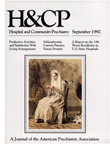Effect of Case Management on Rehospitalization and Utilization of Ambulatory Care Services
Abstract
To explore whether intensive case management would reduce discharged psychiatric inpatients' rates of rehospitalization and increase their use of out patient ambulatory care services, the authors assigned 435 patients discharged from a public general hospital in New York City to three types of post discharge services: multidisciplinaty intensive outreach case management, less intensive Community Support System (CSS) case management services, or routine after care but no case management. Patients eligible for CSS were
generally more impaired and bad more extensive histories of psychiatric hospitalization. At follow-up 18 to 52 months after entering the study, patients who received intensive outreach case management had twice as many psychiatric hospitalizations as the routine after-care group and bad a pattern of utilization of hospital-based ambulatory care services similar to the more impaired CSS group. intensive outreach case management did not appear to stimulate sufficient use of ambulatory care services to reduce patients' frequency of psychiatric hospitalization.
Access content
To read the fulltext, please use one of the options below to sign in or purchase access.- Personal login
- Institutional Login
- Sign in via OpenAthens
- Register for access
-
Please login/register if you wish to pair your device and check access availability.
Not a subscriber?
PsychiatryOnline subscription options offer access to the DSM-5 library, books, journals, CME, and patient resources. This all-in-one virtual library provides psychiatrists and mental health professionals with key resources for diagnosis, treatment, research, and professional development.
Need more help? PsychiatryOnline Customer Service may be reached by emailing [email protected] or by calling 800-368-5777 (in the U.S.) or 703-907-7322 (outside the U.S.).



